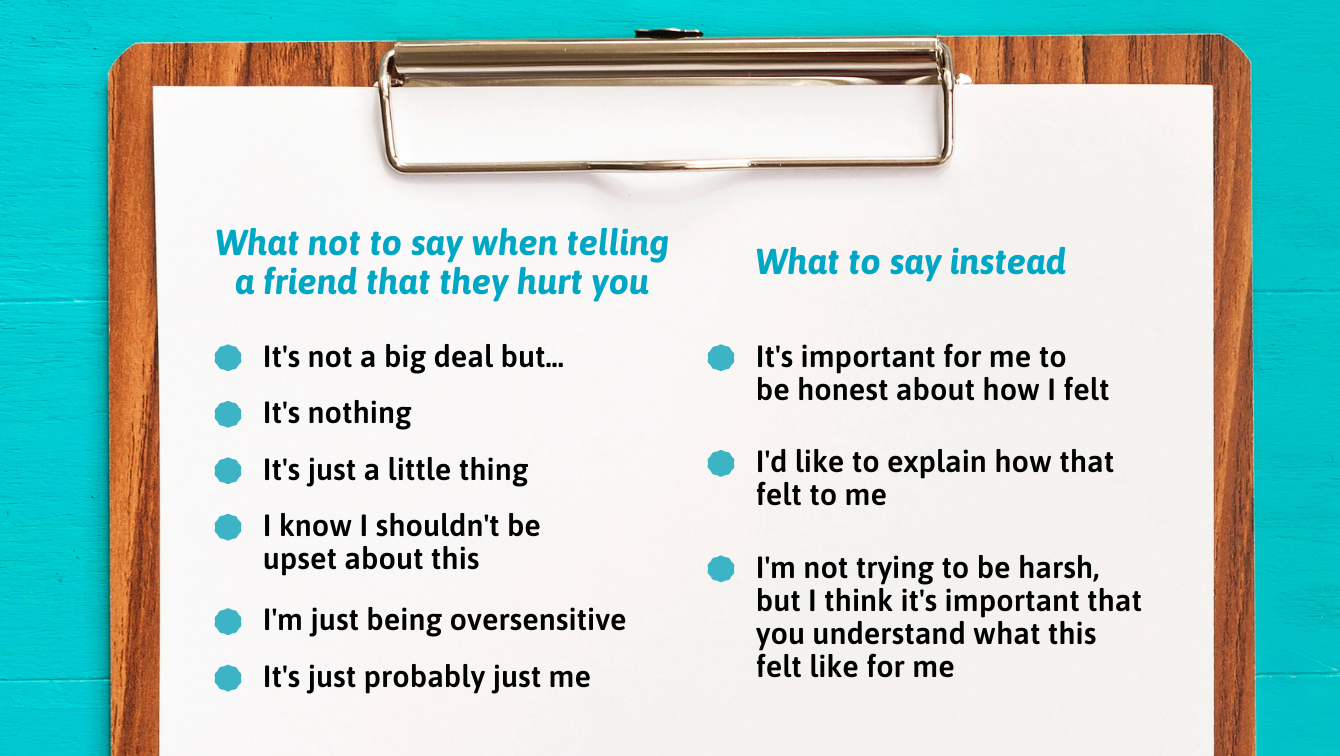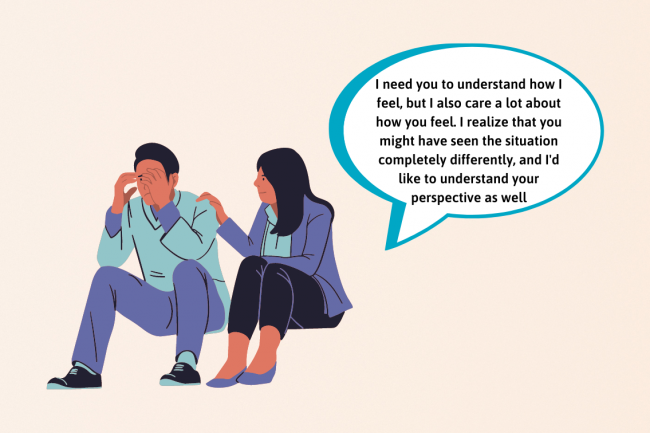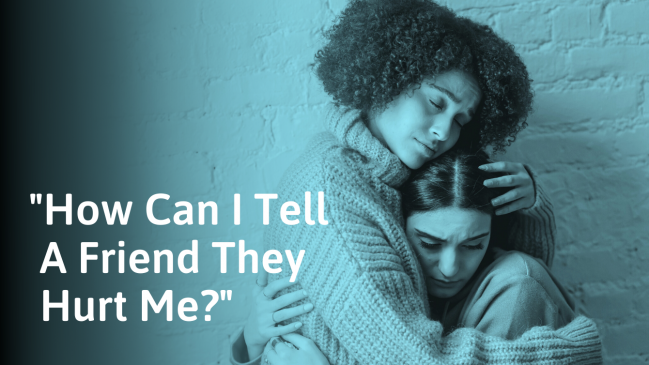Telling someone you care about that they’ve hurt you can be scary. You might worry about hurting someone’s feelings or that you might come across as too aggressive. Often, we want to talk about the thing that’s upset us, but we don’t want to ruin the relationship.[1]
Far from ruining a friendship, finding a good way to communicate your negative emotions to someone you care about can actually deepen the bond you have.[2] Here are some examples of how to tell someone they hurt you emotionally and what you need to think about to make the conversation more tactful and productive.
1. Take some time to understand your feelings
When a friend hurts you, it’s worth taking some time to understand exactly what upset you and why. Sometimes, this ties into something from your past.[3]
For example, if you’re hurt that your friend didn’t invite you to their birthday, you might realize that you had the same feeling when you were a child because your siblings would get invited to events and you felt left out.

Understanding your feelings can help you to decide whether to talk to your friend about it. Sometimes, you’re hurt even though they haven’t done anything wrong. It can help to explain what’s going on, rather than getting angry with them or suggesting that they‘ve been thoughtless.
For example, you could say:
“I’ve been feeling hurt lately. I don’t think you’ve actually done anything wrong, but it’s brought up things from when I was younger, and I’d really like to explain why it left me feeling bad.”
For suggestions to help you understand your feelings, take a look at our tips on how to improve your self-awareness.
2. Choose your moment carefully
If you’re trying to keep a friendship going, it’s helpful to think carefully about it when you start the conversation. Try to find a point where both of you have nothing to do for a few hours and when you’re not stressed or focused on something else.
Remember that you don’t know what else they might be dealing with in their life. Try to give them some say about when you talk about the problem. Let them know that you want to talk to them about something difficult, and ask them when would be a good time for them.
Think about how you phrase this. Sending them a message saying, “We need to talk” will probably leave them anxious. Instead, try saying, “I’ve got something I’d like to talk to you about. Could you let me know when you have a free evening for us to chat?”
This article has examples of difficult conversations that might give you more helpful ideas.
3. Open the conversation gently
If you’re trying to maintain a relationship, it’s helpful to open the conversation with your friend gently.
Try explaining to the other person why you’re having this conversation. The chances are that your friend is important to you, and you want to keep the relationship strong. Explaining this shows them that you’re interested in solving the problem rather than just chewing them out.
Examples of how you might explain why you’re telling a friend that they’ve hurt you include:
“I wanted to talk to you about this because it’s been preying on my mind, and I’d like to clear the air.”
“Your friendship is really important to me, and I want us to be able to be honest with each other about everything. If I’m being completely honest, there’s something that’s upset me, and I’d like to talk to you about it.”
“I’ve been thinking about something recently, and I wasn’t sure whether to bring it up or not. I realized that I’d feel sad if I thought you couldn’t tell me that I’d hurt you, so I thought I owed it to you to let you know how I’m feeling.”
4. Choose your language carefully
The language you use is key to helping you tell a friend that they’ve hurt you in a constructive way.
Aim to share your feelings without making accusations or assuming that your friend had negative motives.
Try using I-statements to tell them what happened and how you felt about it. Saying “When x happened, I felt …” helps you make sure that you’re expressing your own feelings, rather than talking about the other person.[4]
If you’re unsure how to tell someone that they’ve hurt you without blaming them, talk about concrete actions and your feelings rather than making assumptions about their feelings or their motivation.
5. Be honest about what’s going on
When you’re explaining to a friend that they’ve hurt you, it can be tempting to play down how upset you’ve been. If you’ve managed to summon the courage to broach the topic with them, it’s better to be really honest rather than sugar-coating it.
Minimizing the way you are feeling can let the other person think that they don’t have to change their behavior or that what they did wasn’t so bad. You might also feel resentful and not properly understood.[5]
Instead, be really honest about how you’re feeling. This can be scary because it makes you vulnerable toward your friend. Try reminding yourself that you’re already being brave by raising the topic. Being honest now is going to be less awkward and uncomfortable than having to start the conversation again later on.
Examples of what not to say when telling a friend that they hurt you
- “It’s not a big deal but…”
- “It’s nothing”
- “It’s just a little thing”
- “I know I shouldn’t be upset about this”
- “I’m just being oversensitive”
- “It’s probably just me”
What to say instead
- “It’s important for me to be honest about how I felt”
- “I’d like to explain how that felt to me”
- “I’m not trying to be harsh, but I think it’s important that you understand what this felt like for me”

6. Listen to what the other person has to say
When a friend has hurt you, it can be tempting to feel like the conversation should be all about you telling them what they did wrong and them listening. If you want to rebuild your relationship, it’s important to listen to what they have to say as well.[6]
If you’re still very hurt or angry, you might want to wait until you’re able to listen to the other person with an open mind before having the conversation.
Your friend might remember the situation differently, or maybe they didn’t realize that you were unhappy about it. They might feel awful when they realize they hurt you, and this could lead them to lash out. You don’t need to accept poor behavior from them or believe what they tell you, but it is helpful to keep an open mind.

7. Know what you would like them to do differently
If you want to keep a friendship going after they’ve hurt you, try to keep the conversation constructive. Focusing on what you would like the other person to do differently in the future demonstrates that you still want them to be a part of your life.
When you’re telling someone how they’ve hurt you, it’s easy for them to feel like you’re writing them off as a bad person.[7] Talking about how you want them to behave differently in the future makes it clear that you still care about them whilst also setting clear boundaries with your friend.
Explaining how you would like them to behave in the future can also help your friend to understand exactly why you were unhappy with their behavior. Sometimes, the other person will be grateful to you for opening up the conversation and explaining what you need in the future. They might know that they’ve done wrong but be unsure how to fix it. Telling them what you would like done differently can take that pressure off of them.
For example, you might say:
“I felt really disrespected when you yelled at me. I understand you were angry, but in the future, I need you to take a minute when you feel like that so we can talk about what annoyed you respectfully.”
“I really need you to let me know if you’re going to be late so I’m not left waiting for you again.”
“If we’re going to rebuild the trust between us, this is what I need.”
8. Avoid falling into old fights
When you’re trying to talk about how your friend has hurt you, it’s important to stay focused on the current problem and not go over old arguments and disputes.
Writing down your thoughts, for example, in a letter or email that you don’t send, can help you to get your thoughts straight and focus on the specific problem.
It can also be helpful to avoid making sweeping statements, such as “you always” or “you never.” These types of statements often lead your conversations to derail into arguing about past poor behavior or bickering about who did what at various points in the past.
If you notice you’re falling into an old argument, be honest about what you’ve noticed.
“I think we’re starting to drift into a general fight rather than trying to sort out the problem we started with. We probably do need to talk about the other stuff, but could we save it for a later conversation, please?
9. Take breaks if you need to
Talking to a friend who has hurt you can be an intense emotional experience, and it’s OK to take a break if the conversation isn’t going well. If you do need to take a break, explain to the other person what you need and why.
You could say, “I still want to talk about this, but I can feel that I’m getting quite emotional, and I suspect you might be too. How about we take a half-hour break and come back to it then?”
Do come back to the conversation. Letting the conversation slide without resolving the argument can make it harder to talk about it later on. If you do decide to put the conversation on hold for more than a half-hour or so, try to arrange when you’ll talk again before you leave.
You could say, “I agree that we shouldn’t keep talking now, but I don’t want this hanging over either of us for longer than it needs to. Are you free tomorrow at lunchtime to talk again?”
10. Decide what you want to do about the friendship
Not all friendships can be saved. If your friend doesn’t respond well when you explain how they’ve hurt you, you might want to consider what you want to do about the friendship.
If your friend doesn’t care that they’ve hurt you deeply, or if they’re too defensive to accept that their behavior needs to change, it might not be possible to resolve the problems.
Before you start the conversation, try to have reasonable expectations for what you want from the other person. They might not ever apologize or admit that they were in the wrong, so try to focus on things you can control. Being honest about your feelings and setting boundaries could help increase your self-esteem and confidence, even if your friend never apologizes.
Try to think about exactly what your friendship means to you and whether you are happier with them in your life or not. If they attempt to belittle you, dismiss your feelings, or attempt to gaslight you, they may be a toxic friend.[8]
Remember that, even if someone apologizes, you don’t have to forgive them. You can decide whether to stay close friends, keep more of a distance from now on, or even end the friendship completely.
11. Be careful talking over text
It might seem like having a conversation over text, email, or even a letter could be a less confrontational or stressful way of sharing your feelings. If this is your usual method of communication, you might be able to resolve emotional conflicts between you over text, but it’s usually not the best approach.
When you talk in a text, it’s easy to misread the other person’s tone or to misunderstand each other. If talking face-to-face isn’t possible, try to arrange a voice or video call where you have a better chance to read each other’s body language or tone of voice.
This article on how to healthily express your emotions might be of help.

Common questions
What happens if I don’t tell a friend they hurt me?
Not telling a friend that they’ve hurt you can destroy trust in the relationship and deprives them of a chance to put it right. Bottling up your emotions can also have negative effects on your physical, mental, and emotional well-being.[9]
How do you let go when a friend hurts you?
Sometimes, you can’t let go of the hurt when a friend betrays you, and you have to let go of the friendship instead. Letting go of the hurt usually requires allowing yourself to fully experience the feelings of betrayal and anger. Suppressing them can lead to brooding and make it harder to let go.




